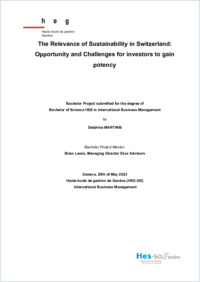The relevance of sustainability in Switzerland : opportunity and challenges for investors to gain potency
SONAR|HES-SO
- Martinis, Delphine
- Lewis, Brian (Degree supervisor)
- Genève : Haute école de gestion de Genève
51 p.
Bachelor of Sciences HES in International Business Management: Haute école de gestion de Genève, 2023
English
The world is facing enormous challenges due to the excessive consumption of natural resources, climate change, demographic changes, and poverty in various parts of the globe are posing significant challenges to the world. (Ernst & Young 2022) The United Nations (UN) Sustainable Development Goals (SDGs) and the Paris Agreement on Climate Change have established specific aims for addressing these issues. The financial sector, acting as a mediator, holds a critical responsibility in achieving these goals and creating a more sustainable economy and society. (Finance durable 2021)
This research investigates the current state of sustainable investment in Switzerland, presenting key findings and data that shed light on the opportunities and challenges faced by investors seeking to align their portfolios with sustainable principles. The objective is to initiate a dialogue with all significant actors and interested parties in the financial sector and encourage practical steps that will facilitate the transition towards a sustainable economy and society in Switzerland.
Switzerland has many strengths, including its noteworthy history in wealth management, exceptional education standards, and its potential to innovate. (SSF 2022) Moreover, the presence of a significant number of international bodies and organizations in the country provides Switzerland with a unique strength and potential competitive advantage. Several of these organizations, including those associated with the United Nations and the World Economic Forum, are already engaged in sustainable finance, either explicitly or implicitly, along with other relevant initiatives. The primary emphasis for effectively tackling urgent global issues is on how the financial industry can generate favourable outcomes for the tangible economy through its operations. To achieve this, it is crucial to comprehend the requirements of investors and their underlying incentives for gaining an advantage.
This analysis is intended for investors who believe in the transition from a conventional approach to sustainable investing. They may be small or large institutions concerned about the long-term stability of the environment and society. They may also be individual investors who want their children and grandchildren to inherit a just and sustainable world. All investors have the opportunity to participate in this important transition, and early adopters will undoubtedly benefit. (Burckart and Lydenberg, 21st Century Investing, 2021)
This research investigates the current state of sustainable investment in Switzerland, presenting key findings and data that shed light on the opportunities and challenges faced by investors seeking to align their portfolios with sustainable principles. The objective is to initiate a dialogue with all significant actors and interested parties in the financial sector and encourage practical steps that will facilitate the transition towards a sustainable economy and society in Switzerland.
Switzerland has many strengths, including its noteworthy history in wealth management, exceptional education standards, and its potential to innovate. (SSF 2022) Moreover, the presence of a significant number of international bodies and organizations in the country provides Switzerland with a unique strength and potential competitive advantage. Several of these organizations, including those associated with the United Nations and the World Economic Forum, are already engaged in sustainable finance, either explicitly or implicitly, along with other relevant initiatives. The primary emphasis for effectively tackling urgent global issues is on how the financial industry can generate favourable outcomes for the tangible economy through its operations. To achieve this, it is crucial to comprehend the requirements of investors and their underlying incentives for gaining an advantage.
This analysis is intended for investors who believe in the transition from a conventional approach to sustainable investing. They may be small or large institutions concerned about the long-term stability of the environment and society. They may also be individual investors who want their children and grandchildren to inherit a just and sustainable world. All investors have the opportunity to participate in this important transition, and early adopters will undoubtedly benefit. (Burckart and Lydenberg, 21st Century Investing, 2021)
- Language
-
- English
- Classification
- Economics
- Notes
-
- Haute école de gestion Genève
- International Business Management
- hesso:hegge
- Persistent URL
- https://folia.unifr.ch/global/documents/327472
Statistics
Document views: 187
File downloads:
- IBMBT_23_MARTINIS_Delphine_VF.pdf: 209
